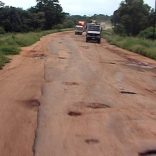Mozambique: Annual deficit of over €500M to repair roads
Mozambique: World Bank grant for disaster management

Photo:Social Media
The World Bank on Wednesday approved a grant of 90 million US dollars to support the Mozambican government’s Disaster Risk Management (DRM) and Resilience Programme.
The money comes from the International Development Association (IDA), the part of the World Bank group which supports the world’s poorest countries, usually through soft loans, but occasionally also through grants.
The bank’s announcement comes in the wake of Cyclone Idai, which hit central Mozambique last Thursday. The cyclone and the subsequent flooding have so far taken at least 202 lives, and this death toll is bound to rise as more information comes in from rural areas, where communications have been disrupted.
According to a World Bank press release, the grant “will support the implementation of the government’s second DRM master plan, which seeks to improve financial protection against natural disaster, including the operationalisation and capitalisation of the recently established Disaster Management Fund; strengthen disaster preparedness and response; and build climate resilience into vulnerable education infrastructure”.
“As we approve this financing, my thoughts go to the families of those who perished during the cyclone Idai and the flooding season in the centre of Mozambique”, said World Bank country director for Mozambique, Mark Lundell, cited in the release. “We will ensure that nine million dollars of this financing be made available for emergency as soon as the project becomes effective.”
“This program seeks precisely to strengthen the capacity of the government to respond quickly and build more resilience in the communities for future climate hazards,” added Lundell.
The release points out that “the poor tend to bear the brunt of natural hazards prompted by climate change as they are often the least prepared and have limited financial capacity to cope”.
The new grant “will directly benefit a total of 3,360,000 people”, it said. “This includes women and other vulnerable groups, as well as children who will benefit from school retrofitting”.
Mozambique’s geographical position exposes it to severe weather events, and there is a long history of cyclones sweeping in from the Mozambique Channel, and of flooding in the major river valleys.
The release says this exposure “is made worse by the effects of climate change, which highlights the importance of strengthening the country’s financial resilience. Without changes in climate and disaster risk management and financing policy, climate change is expected to cause economic damage of up to 7.4 billion dollars during the period 2003 – 50”.
A World Bank senior urban specialist and the project’s task team leader, Michel Matera, warned that “the negative impact of economic and disaster-related shocks is exacerbated, among other things, by limited fiscal space to respond quickly and effectively to these shocks”.
The release notes that “public resources allocated ex-ante for emergency response and recovery have systematically been significantly lower than the funds needed to cope with catastrophic events”.
So the new programme “will seek to maximise innovative financing approaches such as encouraging the government to purchase sovereign risk transfer products from the insurance and capital markets to manage the financial impacts of disaster shocks”.
It believes that, with this approach, “the government could leverage up to 120 million dollars of private sector capital to support the financing of disaster response in Mozambique”.
The total funding for the program is 132.27 million dollars. In addition to the 90 million from the IDA; 6 million comes from the Global Risk Financing Facility (GRiF); and 36.27 million is counterpart funding from the Mozambican government.












Leave a Reply
Be the First to Comment!
You must be logged in to post a comment.
You must be logged in to post a comment.